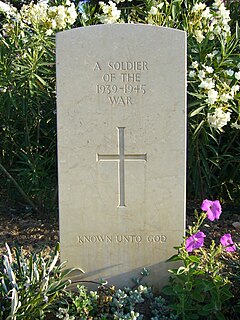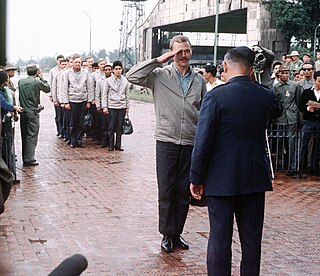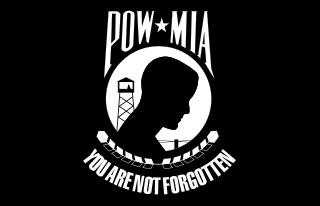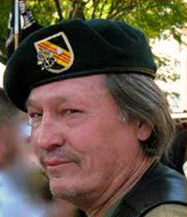Related Research Articles

Douglas Brian "Pete" Peterson is an American politician and diplomat. He served as a United States Air Force pilot during the Vietnam War and spent over six years as a prisoner of the North Vietnamese army after his plane was shot down. He returned to Hanoi when he became the first United States Ambassador to Vietnam in 1997. He was an ambassador until July 2001, after which he devoted himself to philanthropic work.

Missing in action (MIA) is a casualty classification assigned to combatants, military chaplains, combat medics, and prisoners of war who are reported missing during wartime or ceasefire. They may have been killed, wounded, captured, executed, or deserted. If deceased, neither their remains nor grave has been positively identified. Becoming MIA has been an occupational risk for as long as there has been warfare.
Bùi Tín was a Vietnamese dissident and People's Army of Vietnam colonel. After the war, he became disillusioned by corruption and the continuing isolation of the newly-unified Vietnam and decided to leave Vietnam and live in exile in Paris to express his growing dissatisfaction with Vietnam's Communist leadership and their political system.

Rolling Thunder is a United States advocacy group that seeks to bring full accountability for prisoners of war (POWs) and missing in action (MIA) service members of all U.S. wars. The group's first demonstration was in 1988. It was incorporated in 1995, and has more than 90 chapters throughout the US, as well as overseas.
The Defense Prisoner of War/Missing Personnel Office (DPMO), as part of the United States Department of Defense, was an organization that reported to the Under Secretary of Defense for Policy through the Assistant Secretary of Defense. DPMO provided centralized management of prisoner of war/missing personnel (POW/MP) affairs within the Department of Defense.

Sybil Elizabeth Stockdale was an American campaigner for families of Americans missing in South East Asia.
Mount POW/MIA is a mountain in the U.S. state of Alaska that has been dedicated to all the soldiers that are or have been given the status of Prisoner of War or Missing in Action (POW/MIA). The mountain is just north of Eklutna Lake and is west of Twin peaks and Bull Peak, six miles southeast of Wasilla in Chugach State Park. There is a POW/MIA flag placed atop of Mount POW/MIA and is replaced annually by the Local Colony Army JROTC program during Memorial weekend in May. The black and white flag was designed by the National League of Families of American Prisoners and Missing in Southeast Asia and has been flown at the White House.

The Joint POW/MIA Accounting Command was a joint task force within the United States Department of Defense (DoD) whose mission was to account for Americans who are listed as Prisoners of War (POW), or Missing in Action (MIA), from all past wars and conflicts. It was especially visible in conjunction with the Vietnam War POW/MIA issue. The mission of the Joint POW/MIA Accounting Command was to achieve the fullest possible accounting of all Americans missing as a result of the nation's past conflicts. The motto of JPAC was "Until they are home".

Operation Homecoming was the return of 591 American prisoners of war (POWs) held by North Vietnam following the Paris Peace Accords that ended U.S. involvement in the Vietnam War.

The National League of Families of American Prisoners and Missing in Southeast Asia, commonly known as the National League of POW/MIA Families or the League, is an American 501(c)(3) humanitarian organization that is concerned with the Vietnam War POW/MIA issue. According to the group's web site, its sole purpose is "to obtain the release of all prisoners, the fullest possible accounting for the missing and repatriation of all recoverable remains of those who died serving our nation during the Vietnam War in Southeast Asia." The League's most prominent symbol is its famous flag.

The National League of Families POW/MIA flag, often referred to as the POW/MIA flag, was adopted in 1972 and consists of the official emblem of the National League of Families of American Prisoners and Missing in Southeast Asia in white on a black background. In 2019 the National POW/MIA Flag Act was signed into law, requiring the POW/MIA flag to be flown on certain federal properties, including the U.S. Capitol Building, on all days the U.S. flag is flown.
The U.S.–Russia Joint Commission on POWs/MIAs (USRJC) was established in 1992 by the presidents of the United States and the Russian Federation, George H. W. Bush and Boris Yeltsin. The USRJC was established to determine the fates of the United States's and the Soviet Union's unaccounted-for service personnel from World War II, the Korean War, the Cold War, Afghanistan and the Vietnam War, Laos and Cambodia.
The Senate Select Committee on POW/MIA Affairs was a special committee convened by the United States Senate during the George H. W. Bush administration to investigate the Vietnam War POW/MIA issue, that is, the fate of United States service personnel listed as missing in action during the Vietnam War. The committee was in existence from August 2, 1991 to January 2, 1993.
The Vietnam War POW/MIA issue concerns the fate of United States servicemen who were reported as missing in action (MIA) during the Vietnam War and associated theaters of operation in Southeast Asia. The term also refers to issues related to the treatment of affected family members by the governments involved in these conflicts. Following the Paris Peace Accords of 1973, 591 U.S. prisoners of war (POWs) were returned during Operation Homecoming. The United States listed about 2,500 Americans as prisoners of war or missing in action but only 1,200 Americans were reported to have been killed in action with no body recovered. Many of these were airmen who were shot down over North Vietnam or Laos. Investigations of these incidents have involved determining whether the men involved survived being shot down. If they did not survive, then the U.S. government considered efforts to recover their remains. POW/MIA activists played a role in pushing the U.S. government to improve its efforts in resolving the fates of these missing service members. Progress in doing so was slow until the mid-1980s when relations between the United States and Vietnam began to improve and more cooperative efforts were undertaken. Normalization of the U.S. relations with Vietnam in the mid-1990s was a culmination of this process.

Newton Foust Heisley was an American commercial artist who was responsible for the design of the POW/MIA flag for the National League of Families, which was officially recognized by the United States Congress in relation to the Vietnam War POW/MIA issue "as the symbol of our Nation's concern and commitment to resolving as fully as possible the fates of Americans still prisoner, missing and unaccounted for in Southeast Asia, thus ending the uncertainty for their families and the Nation".
Members of the United States armed forces were held as prisoners of war (POWs) in significant numbers during the Vietnam War from 1964 to 1973. Unlike U.S. service members captured in World War II and the Korean War, who were mostly enlisted troops, the overwhelming majority of Vietnam-era POWs were officers, most of them Navy, Air Force, and Marine Corps airmen; a relatively small number of Army enlisted personnel were also captured, as well as one enlisted Navy seaman, Petty Officer Doug Hegdahl, who fell overboard from a naval vessel. Most U.S. prisoners were captured and held in North Vietnam by the People's Army of Vietnam (PAVN); a much smaller number were captured in the south and held by the Việt Cộng (VC). A handful of U.S. civilians were also held captive during the war.

Baron 52 was the call sign of a United States Air Force EC-47 carrying eight crew members that was shot down over Laos during the predawn hours of 5 February 1973, a week after the Paris Peace Accords officially ended the United States involvement in the Vietnam War. The remains of four crewmen were recovered from the crash site, but those of the remaining four have never been found. Although the U.S. government considers them to have been killed in action and as late as 1996 listed them as "accounted for", family members and POW/MIA advocates believe the four survived the crash and were taken captive and possibly sent to the USSR. The intelligence gatherers and their equipment would have been highly valued by the Soviets who maintained a presence both in Laos and North Vietnam. The incident has been featured on several nationwide news programs and a 1991 episode of the U.S. television series Unsolved Mysteries.

Theodore Lane Sampley was an American Vietnam War veteran and activist. He primarily advocated for those servicemembers still considered missing in action or prisoners of war (POW-MIA) as of the end of hostilities in 1975. A staunch political conservative, he also ran for local political office several times. He is credited with the research that identified Air Force Lt. Michael Blassie as the Vietnam fatality buried at the Tomb of the Unknown Soldier, and for his role in organizing the annual Rolling Thunder motorcycle event in Washington. In Kinston, North Carolina, where he lived for much of his adult life, he was known for his local civic activism, most notably his effort to build a replica of the Confederate ironclad CSS Neuse, the only full-size replica of a Confederate ironclad, in the city's downtown.

Phillip Neal "Phil" Butler was the eighth-longest-held U.S. prisoner of war (POW) held in North Vietnam during the Vietnam War. Butler, a Navy pilot, who was forced to eject after a mid-air explosion on April 20, 1965 and served as a prisoner of war in North Vietnam until his release as part of Operation Homecoming in 1973. Butler was one of the four POW's credited with establishing the tap code. The code enabled the prisoners to communicate with each other.
References
- 1 2 Keating, Susan Katz (1994). Prisoners of Hope:: Exploiting the POW/MIA Myth in America. New York: Random House. ISBN 0-679-43016-4. p. 52.
- ↑ McConnell, Malcolm; Theodore G. Schweitzer III (1995). Inside Hanoi's Secret Archives: Solving the MIA Mystery. Simon & Schuster. ISBN 0-671-87118-8. p. 390.
- 1 2 Barbara Crossette (1992-06-16). "Gulag Held M.I.A.'s, Yeltsin Suggests". The New York Times .
- ↑ Clifford Kraus (1993-01-14). "Senate Panel Report Fails to Settle M.I.A. Dispute". The New York Times .
- ↑ "Vietnam-era unaccounted for statistical report" (PDF). 5 August 2010. Archived from the original (PDF) on September 26, 2012.